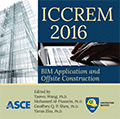International Conference on Construction and Real Estate Management 2016
The Impact of Institutional Context on Organizational Evolution: The Case of a Project-Based Enterprise
Publication: ICCREM 2016: BIM Application and Off-Site Construction
ABSTRACT
In this paper, we focus on the stages of organizations and their evolvement process by investigating a project-oriented enterprise. We look at the different stages through the lens of institutional theory and illustrate how different institutions may lead the organization to a new mode. Longitudinal archival method was employed to examine organizational change along with institutional context, and data were collected from multiple sources, including government regulations, archival records of projects, websites, news articles, and internal files of this enterprise. A conceptual framework was presented to integrate the findings. Enterprise strategy of a company directly influences its organizational reform, while predictability of project context defines whether the organization changes positively or passively. Additionally, power of government is also an important factor affecting organizational arrangement. This article presents key findings and insights from our inductive research. The research adds to our knowledge and understanding of the institutional factors affecting a project-based company’s evolution and supplies some perspectives useful to practitioners.
Get full access to this chapter
View all available purchase options and get full access to this chapter.
ACKNOWLEDGMENTS
The authors would like to acknowledge the financial support provided by the National Natural Science Foundation of China (project numbers: 71390523).
REFERENCES
Aaltonen, K. and Kujala, J. (2010). “A project lifecycle perspective on stakeholder influence strategies in global projects.” Scandinavian Journal of Management, 26(4), 381–397.
Ahola, T., Ruuska, I., Artto, K. and Kujala, J. (2014). “What is project governance and what are its origins?” International Journal of Project Management, 32(8), 1321–1332.
Artto, K. and Kujala, J. (2008). “Project business as a research field.” International Journal of Managing Projects in Business, 1(4), 469–497.
Chi, C.S.F. and Nicole, J.W.A. (2011). “Institutional effects on project arrangement: high-speed rail projects in China and Taiwan.” Construction Management and Economics, 29(6), 595–611.
Child, J. and Tsai, T. (2005). “The dynamic between firms’ environmental strategies and institutional constraints in emerging economies: evidence from China and Taiwan.” Journal of Management Studies, 42(1), 95–125.
Cova, B., Ghauri, P.N. and Salle, R. (2002). Project marketing: beyond competitive bidding, John Wiley & Sons Ltd., West Sussex.
Davies, A. and Hobday, M. (2005). “The business of projects: managing innovation in complex products and systems.” Technovation, 28(10), 709–710.
Eisenhardt, K.M. (1989). “Building theories from case study research.” Academy of Management Review, 14(4), 532–550.
Gunnarson, S. and Levitt, R.E. (1982). “Is a building construction project a hierarchy or a market.” Proceedings from the Proceedings from the 7th Internet Congress on Project Management, Copenhagen.
Hartley, J. (2004). “Chapter: Case study research.” Essential guide to qualitative methods in organizational research, Sage Publications Ltd., London, 323–333.
Henisz, W.J., Levitt, R.E. and Scott, W.R. (2012). “Toward a unified theory of project governance: economic, sociological and psychological supports for relational contracting.” Engineering Project Organization Journal, 2(1), 37–55.
Lindkvist, L. (2008). “Project organization: exploring its adaptation properties.” International Journal of Project Management, 26(1), 13–20.
McAdam, D., Boudet, H.S., Davis, J., Orr, R.J., Richard, S.W. and Levitt, R.E. (2010). “‘Site Fights’: explaining opposition to pipeline projects in the developing world 1.” Sociological Forum, 25(3), 401–427.
Mitchell, R.K., Agle, B.R. and Wood, D.J. (1997). “Toward a theory of stakeholder identification and salience: defining the principle of who and what really counts.” Academy of Management Review, 22(4), 853–886.
Morris, P. and Jamieson, A. (2005). “Moving from corporate strategy to project strategy.” Project Management Journal, 36(4), 5–18.
Sallinen, L., Ahola, T. and Ruuska, I. (2011). “Governmental stakeholder and project owner’s views on the regulative framework in nuclear projects.” Project Management Journal, 42(6), 33–47.
Scott, W. (2008). Institutions and organizations: ideas and interests (3rd edition), Sage Publications, Los Angeles.
Scott, W.R., Levitt, R.E. and Orr, R.J. (2011). “Global projects: Institutional and political challenges.” Cambridge University Press, Cambridge.
Siggelkow, N. (2007). “Persuasion with case studies.” Academy of Management Journal, 50(1), 20–24.
Shenhar, A., Dvir, D., Milosevic, D., Mulenburg, J., Patanakul, P., Reilly, R., Ryan, M., Sage, A., Sauser, B. and Srivannaboon, S. (2005). “Toward a NASA-Specific project management framework.” Engineering Management Journal, 17(4), 8–16.
Srivannaboon, S. and Miloševic, D.Z. (2006). “A theoretical framework for aligning project management with business strategy.” Project Management Journal, 37(3), 98–110.
Toivonen, A. and Toivonen, P.U. (2014). “The transformative effect of top management governance choices on project team identity and relationship with the organization: an agency and stewardship approach.” International Journal of Project Management, 32(8), 1358–1370.
Ventresca, M.J. and Mohr, J.W. (2002). “Chapter: Archival research methods.” The Blackwell companion to organizations, Blackwell Publishers, Oxford, 805–828.
Yin, R.K. (2003). Case study research: design and methods, SAGE Publications. New York.
Information & Authors
Information
Published In
ICCREM 2016: BIM Application and Off-Site Construction
Pages: 814 - 821
Editors: Yaowu Wang, Ph.D., Professor, Harbin Institute of Technology, Mohamed Al-Hussein, Ph.D., Professor, University of Alberta, Geoffrey Q. P. Shen, Ph.D., Professor, The Hong Kong Polytechnic University, and Yimin Zhu, Ph.D., Professor, Louisiana State University
ISBN (Online): 978-0-7844-8027-4
Copyright
© 2017 American Society of Civil Engineers.
History
Published online: Aug 14, 2017
Authors
Metrics & Citations
Metrics
Citations
Download citation
If you have the appropriate software installed, you can download article citation data to the citation manager of your choice. Simply select your manager software from the list below and click Download.
